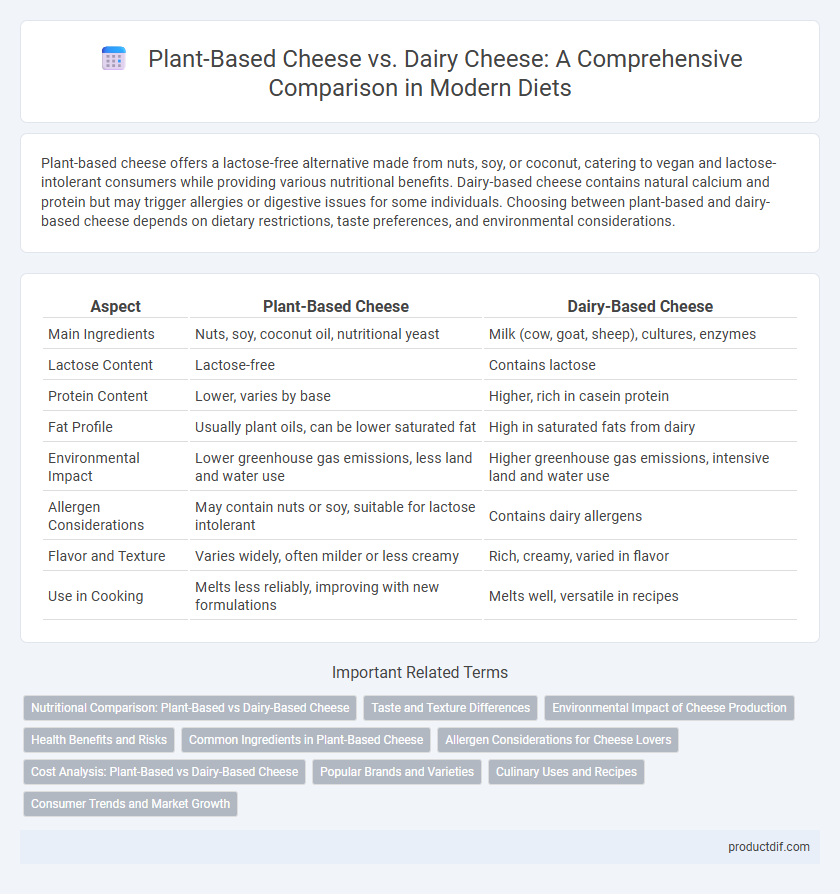Plant-based cheese offers a lactose-free alternative made from nuts, soy, or coconut, catering to vegan and lactose-intolerant consumers while providing various nutritional benefits. Dairy-based cheese contains natural calcium and protein but may trigger allergies or digestive issues for some individuals. Choosing between plant-based and dairy-based cheese depends on dietary restrictions, taste preferences, and environmental considerations.
Table of Comparison
| Aspect | Plant-Based Cheese | Dairy-Based Cheese |
|---|---|---|
| Main Ingredients | Nuts, soy, coconut oil, nutritional yeast | Milk (cow, goat, sheep), cultures, enzymes |
| Lactose Content | Lactose-free | Contains lactose |
| Protein Content | Lower, varies by base | Higher, rich in casein protein |
| Fat Profile | Usually plant oils, can be lower saturated fat | High in saturated fats from dairy |
| Environmental Impact | Lower greenhouse gas emissions, less land and water use | Higher greenhouse gas emissions, intensive land and water use |
| Allergen Considerations | May contain nuts or soy, suitable for lactose intolerant | Contains dairy allergens |
| Flavor and Texture | Varies widely, often milder or less creamy | Rich, creamy, varied in flavor |
| Use in Cooking | Melts less reliably, improving with new formulations | Melts well, versatile in recipes |
Nutritional Comparison: Plant-Based vs Dairy-Based Cheese
Plant-based cheese generally contains lower saturated fat and cholesterol compared to dairy-based cheese, making it a heart-healthier option. Dairy-based cheese provides higher levels of complete protein and calcium, essential for muscle and bone health. Nutritional content varies widely among plant-based cheeses, with some fortified to match the vitamin and mineral profile of traditional dairy cheese.
Taste and Texture Differences
Plant-based cheese often presents a firmer, sometimes grainier texture compared to the creamy, smooth consistency characteristic of dairy-based cheese, influenced by the absence of casein proteins. The taste of plant-based cheese varies widely, frequently exhibiting nutty or tangy notes derived from ingredients like nuts or soy, while dairy cheese offers a richer, more complex flavor profile due to natural fermentation and aging processes. Consumers seeking dairy alternatives may notice less umami depth and meltability in plant-based options, although ongoing improvements in formulation are narrowing these sensory gaps.
Environmental Impact of Cheese Production
Plant-based cheese production generates significantly lower greenhouse gas emissions compared to dairy-based cheese, reducing carbon footprint by up to 90%. Water consumption for plant-based cheese is substantially less, saving thousands of liters per kilogram produced versus traditional dairy methods. Land use efficiency also favors plant-based cheese, minimizing deforestation and habitat loss associated with dairy farming.
Health Benefits and Risks
Plant-based cheese typically contains lower saturated fat and cholesterol compared to dairy-based cheese, reducing the risk of heart disease and benefiting overall cardiovascular health. However, some plant-based cheeses may have lower protein content and added preservatives, which can impact nutritional value. Dairy-based cheese provides essential nutrients like calcium and vitamin B12 but can contribute to higher saturated fat intake and lactose intolerance issues.
Common Ingredients in Plant-Based Cheese
Plant-based cheese commonly contains ingredients such as nuts (cashews, almonds), coconut oil, nutritional yeast, tapioca starch, and plant-based proteins derived from soy or pea. These components provide creaminess, flavor, and meltability, mimicking the texture of dairy cheese without lactose or cholesterol. Fortified vitamins like B12 and calcium are often added to enhance nutritional value similar to traditional cheese.
Allergen Considerations for Cheese Lovers
Plant-based cheese offers a valuable alternative for individuals with dairy allergies or lactose intolerance, as it is typically free from milk proteins like casein, a common allergen in dairy-based cheese. Many plant-based cheeses use nuts, seeds, or soy, which may introduce other allergens, so consumers must carefully check ingredient labels to avoid reactions. Choosing cheese based on allergen profiles ensures safe consumption for cheese lovers with specific dietary restrictions or sensitivities.
Cost Analysis: Plant-Based vs Dairy-Based Cheese
Plant-based cheese generally incurs higher production costs due to specialized ingredients like nuts, nutritional yeast, and stabilizers, resulting in retail prices that are 20-50% higher than traditional dairy-based cheese. Dairy-based cheese benefits from established supply chains and economies of scale, making it more affordable for consumers seeking budget-friendly options. However, ongoing advancements in plant-based cheese production are gradually narrowing the price gap, promoting wider market accessibility.
Popular Brands and Varieties
Popular plant-based cheese brands include Violife, Miyoko's Creamery, and Follow Your Heart, offering varieties such as cashew-based mozzarella, almond feta, and coconut oil-based cheddar alternatives. Dairy-based cheese dominates with iconic brands like Kraft, Sargento, and Tillamook, known for cheddar, mozzarella, gouda, and parmesan varieties. Consumers seeking lactose-free or vegan options often favor plant-based cheeses for their diverse flavors and allergen-friendly ingredients.
Culinary Uses and Recipes
Plant-based cheese offers a versatile alternative in culinary recipes, providing suitable textures and flavors for vegan pizzas, pasta dishes, and sandwiches. Dairy-based cheese remains preferred for its rich, creamy melt and complex flavor in traditional recipes like macaroni and cheese, fondue, and cheeseburgers. Both cheeses can be adapted for sauces, gratins, and baked goods, but plant-based options often require specific processing to achieve similar melting and stretch qualities.
Consumer Trends and Market Growth
Plant-based cheese is experiencing rapid market growth due to rising consumer demand for vegan, lactose-free, and environmentally sustainable food options, with the global plant-based cheese market projected to reach over $3 billion by 2027. Dairy-based cheese remains dominant in traditional markets but faces challenges from health-conscious consumers shifting towards plant-based alternatives. Innovations in flavor, texture, and nutritional content in plant-based cheese are accelerating adoption across mainstream retail and foodservice sectors.
Plant-based cheese vs Dairy-based cheese Infographic

 productdif.com
productdif.com